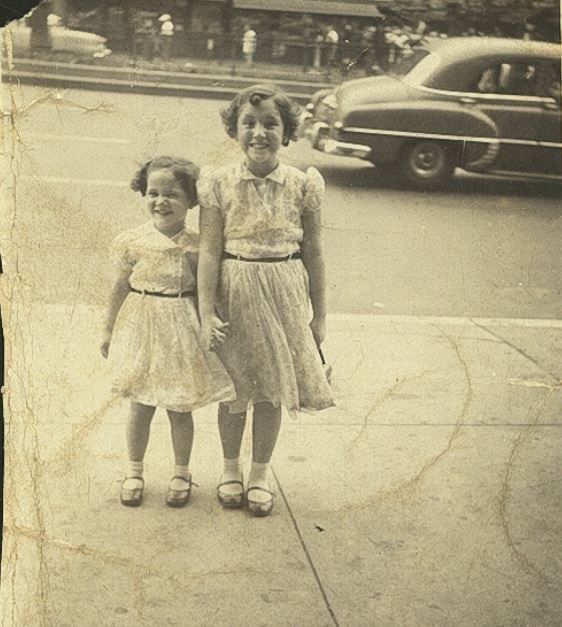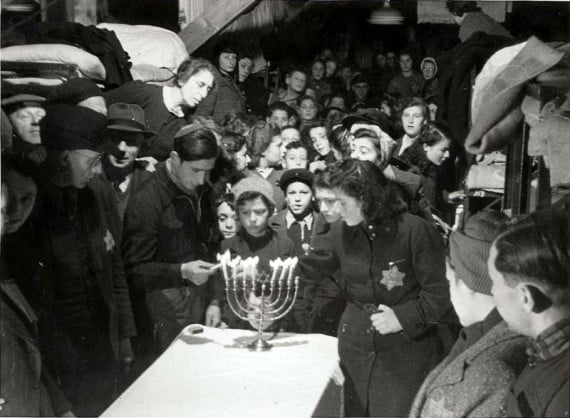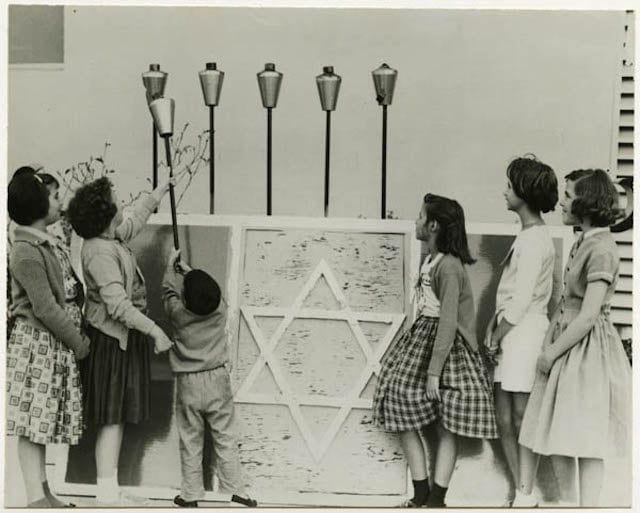Blog Archive
Our American Holiday: Refugees and the Meaning of Hanukkah
December 19, 2017
What is the American holiday tradition? It might not be what you think it is. Or rather, it’s everything you think it is: if you live in this country and are celebrating this holiday season, your customs, celebrations, and beliefs are woven into the fabric of the American cultural tapestry. Throughout the month of December, we’ll be looking at these different customs – where they came from, how they’ve evolved, and how they’ve become integral to defining what we know as “Our American Holiday.”
Celebrating Hanukkah in the Epstein Home

Bella Epstein (right) with her sister on Orchard Street
Every winter, Bella Epstein (Finding Home) would gather with her family to light the Hanukkah candles. Her mother Rivka, a Holocaust survivor, always insisted that Bella’s childhood be filled with light and color and joy, so it’s likely the new American way of celebrating would have been adopted by them early on. For eight nights, their traditions would come to include catchy songs, lively games, and treasured presents. And their menorah would be one of many illuminating the windows of the tenements on Orchard Street.
What Does Hanukkah Celebrate?
In the Jewish faith, every moment is a story. And from every story, comes an opportunity to learn, to interpret new meanings from centuries-old tales in order to make sense of modern-day hardships. The story of Hanukkah is one such tale – how can one relate to a two thousand-year-old victory by the Maccabees against the Syrian Greek army?
While there is much to be appreciated from a military battle, it is the story of the aftermath, the survivors, the miracle of their continuation that early Rabbis chose to focus on. Hanukkah is the holiday of rededication, in remembrance of the Holy Temple of Jerusalem which had been sacked and destroyed during the fighting. “Very few remember when the Temple was first dedicated,” says Rabbi David Wolpe, “but almost all Jews remember when it was rededicated.”
The Rabbi goes on to say how people who have experienced such unbelievable hardship, such as “Holocaust survivors, refugees who fled oppression, people plagued with illness and others to whom life has dealt cruel blows,” – how they might take this concept of rededication to heart. Given every reason to despair, to grow cold, to become hateful, a bright future is possible, if one is strong and determined enough to rededicate themselves to a better life.
Hanukkah in America
It is both easy to imagine and hard to contemplate the mixture of emotions felt by Holocaust refugees Regina and Kalman Epstein, when their ship arrived in New York Harbor on April 22, 1947. Trepidation, exhaustion, fear, hope. By the time their daughter Bella was born the following year, the Epsteins had begun adjusting to the American way of life. They had a home in New York City, were starting a family, and were taking part in their community.
While we don’t know for sure how the Epsteins celebrated, there is evidence of Hanukkah celebrations taking place in the ghettos and camps throughout Europe during World War II. Both Regina and Kalman were religious, and during times of great persecution, the importance of these rituals increased, even if the rituals themselves had to be subdued. “Already in the Talmud,” says Rabbi Wolpe, “there are provisions for lighting secretly in times of persecution.”

Jews in the Westerbork transit camp in Holland light candles for the seventh night of Chanukah.
We can surmise, though, the shock they must have felt, living in America in the years following World War II, and seeing the differences in the holiday celebration. By this period of time, Hanukkah had already started to become the Jews answer to Christmas. In the late 19th century, America was going through a lot of changes. Waves of immigration, industrialization, and urbanization created an attitude of upheaval. Emphasizing winter holidays became a way of boosting American morale. The sentimental home celebrations became even more important, with two major wars being fought overseas in the first half of the 20th century. And, by the time the Epsteins lived in New York in the 1950s, American manufacturers were making and selling goods at a higher volume than ever, and the middle class was born. People used the opportunity of the holidays to showcase their wealth, as well as providing delights for children that parents never received themselves.
The Meaning of Hanukkah
Hanukkah in America meant something extra, though, for Jews immigrating to the U.S. After decades of persecution – from the pogroms in the 19th century to the Holocaust in the 20th – here was a place they could celebrate their religion openly. Here, their holiday was mainstream. Refugees no longer had to worry about openly celebrating Hanukkah.

Giant Hanukkah candlelight ceremony at JCC, circa 1950 (Courtesy of the Center for Jewish History)
Bella describes the bravery of her parents as they put up a mezuzah in the doorway of their American home. The courage that took, after escaping such horror, to proudly proclaim their Judaism. For refugees and survivors of persecution, maintaining a custom becomes an act of valor.
The Jewish tradition is the tradition of storytelling, and many of these stories are ones of struggle, oppression, and subjugation. In that sense, each Hanukkah candle becomes the hero of that story, glowing in the windows of tenements and houses over the decades and throughout the country.
What is your American holiday tradition? Share it now on Your Story, Our Story!
- Post by Gemma Solomons, Marketing & Communications Coordinator at the Lower East Side Tenement Museum